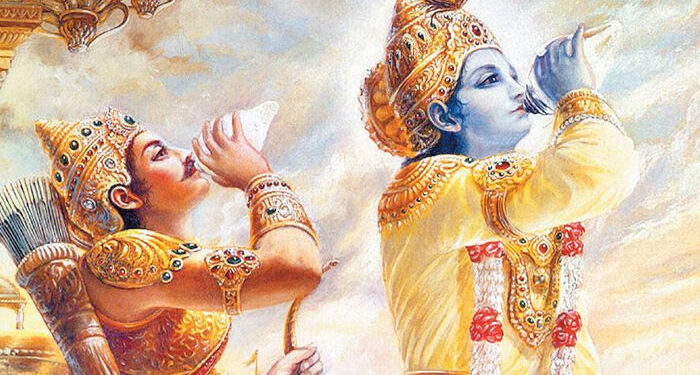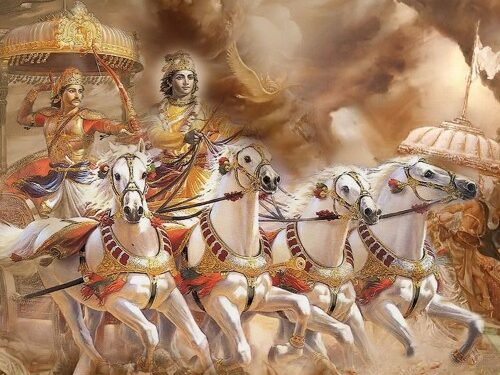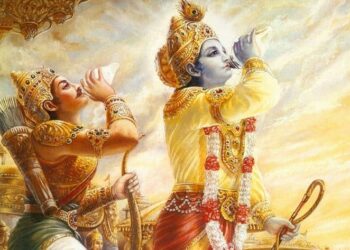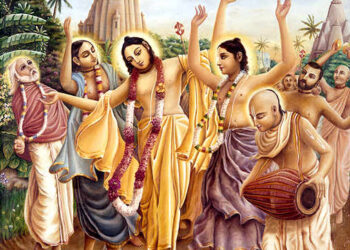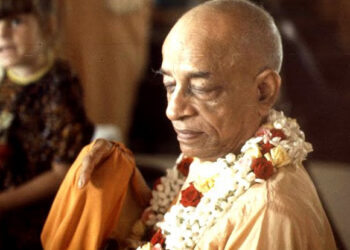TEXT 6
na caitad vidmaḥ kataran no garīyo
yad vā jayema yadi vā no jayeyuḥ
yān eva hatvā na jijīviṣāmas
te ‘vasthitāḥ pramukhe dhārtarāṣṭrāḥ
SYNONYMS
na—nor; ca—also; etat—this; vidmaḥ—do we know; katarat—which; naḥ—for us; garīyaḥ—better; yat vā—whether; jayema—we may conquer; yadi—if; vā—or; naḥ—us; jayeyuḥ—they conquer; yān—those who; eva—certainly; hatvā—by killing; na—never; jijīviṣāmaḥ—we would want to live; te—all of them; avasthitāḥ—are situated; pramukhe—in the front; dhārtarāṣṭrāḥ—the sons of Dhṛtarāṣṭra.
TRANSLATION
Nor do we know which is better—conquering them or being conquered by them. If we killed the sons of Dhṛtarāṣṭra, we should not care to live. Yet they are now standing before us on the battlefield.
PURPORT
Arjuna did not know whether he should fight and risk unnecessary violence, although fighting is the duty of the kṣatriyas, or whether he should refrain and live by begging. If he did not conquer the enemy, begging would be his only means of subsistence. Nor was there certainty of victory, because either side might emerge victorious. Even if victory awaited them (and their cause was justified), still, if the sons of Dhṛtarāṣṭra died in battle, it would be very difficult to live in their absence. Under the circumstances, that would be another kind of defeat for them. All these considerations by Arjuna definitely proved that not only was he a great devotee of the Lord but he was also highly enlightened and had complete control over his mind and senses. His desire to live by begging, although he was born in the royal household, is another sign of detachment. He was truly virtuous, as these qualities, combined with his faith in the words of instruction of Śrī Kṛṣṇa (his spiritual master), indicate. It is concluded that Arjuna was quite fit for liberation. Unless the senses are controlled, there is no chance of elevation to the platform of knowledge, and without knowledge and devotion there is no chance of liberation. Arjuna was competent in all these attributes, over and above his enormous attributes in his material relationships.
TEXT 7
kārpaṇya-doṣopahata-svabhāvaḥ
pṛcchāmi tvāṁ dharma-sammūḍha-cetāḥ
yac chreyaḥ syān niścitaṁ brūhi tan me
śiṣyas te ‘haṁ śādhi māṁ tvāṁ prapannam
SYNONYMS
kārpaṇya—of miserliness; doṣa—by the weakness; upahata—being afflicted; sva-bhāvaḥ—characteristics; pṛcchāmi—I am asking; tvām—unto You; dharma—religion; sammūḍha—bewildered; cetāḥ—in heart; yat—what; śreyaḥ—all-good; syāt—may be; niścitam—confidently; brūhi—tell; tat—that; me—unto me; śiṣyaḥ—disciple; te—Your; aham—I am; śādhi—just instruct; mām—me; tvām—unto You; prapannam—surrendered.
TRANSLATION
Now I am confused about my duty and have lost all composure because of miserly weakness. In this condition I am asking You to tell me for certain what is best for me. Now I am Your disciple, and a soul surrendered unto You. Please instruct me.
PURPORT
By nature’s own way the complete system of material activities is a source of perplexity for everyone. In every step there is perplexity, and therefore it behooves one to approach a bona fide spiritual master who can give one proper guidance for executing the purpose of life. All Vedic literatures advise us to approach a bona fide spiritual master to get free from the perplexities of life, which happen without our desire. They are like a forest fire that somehow blazes without being set by anyone. Similarly, the world situation is such’ that perplexities of life automatically appear, without our wanting such confusion. No one wants fire, and yet it takes place, and we become perplexed. The Vedic wisdom therefore advises that in order to solve the perplexities of life and to understand the science of the solution, one must approach a spiritual master who is in the disciplic succession. A person with a bona fide spiritual master is supposed to know everything. One should not, therefore, remain in material perplexities but should approach a spiritual master. This is the purport of this verse.
Who is the man in material perplexities? It is he who does not understand the problems of life. In the Bṛhad-āraṇyaka Upaniṣad (3.8.10) the perplexed man is described as follows: yo vā etad akṣaraṁ gārgy aviditvāsmāl̐ lokāt praiti sa kṛpaṇaḥ. “He is a miserly man who does not solve the problems of life as a human and who thus quits this world like the cats and dogs, without understanding the science of self-realization.” This human form of life is a most valuable asset for the living entity who can utilize it for solving the problems of life; therefore, one who does not utilize this opportunity properly is a miser. On the other hand, there is the brāhmaṇa, or he who is intelligent enough to utilize this body to solve all the problems of life. Ya etad akṣaraṁ gārgi viditvāsmāl̐ lokāt praiti sa brāhmaṇaḥ.
The kṛpaṇas, or miserly persons, waste their time in being overly affectionate for family, society, country, etc., in the material conception of life. One is often attached to family life, namely to wife, children and other members, on the basis of “skin disease.” The kṛpaṇa thinks that he is able to protect his family members from death; or the kṛpaṇa thinks that his family or society can save him from the verge of death. Such family attachment can be found even in the lower animals, who take care of children also. Being intelligent, Arjuna could understand that his affection for family members and his wish to protect them from death were the causes of his perplexities. Although he could understand that his duty to fight was awaiting him, still, on account of miserly weakness, he could not discharge the duties. He is therefore asking Lord Kṛṣṇa, the supreme spiritual master, to make a definite solution. He offers himself to Kṛṣṇa as a disciple. He wants to stop friendly talks. Talks between the master and the disciple are serious, and now Arjuna wants to talk very seriously before the recognized spiritual master. Kṛṣṇa is therefore the original spiritual master of the science of Bhagavad-gītā, and Arjuna is the first disciple for understanding the Gītā. How Arjuna understands the Bhagavad-gītā is stated in the Gītā itself. And yet foolish mundane scholars explain that one need not submit to Kṛṣṇa as a person, but to “the unborn within Kṛṣṇa.” There is no difference between Kṛṣṇa’s within and without. And one who has no sense of this understanding is the greatest fool in trying to understand Bhagavad-gītā.


